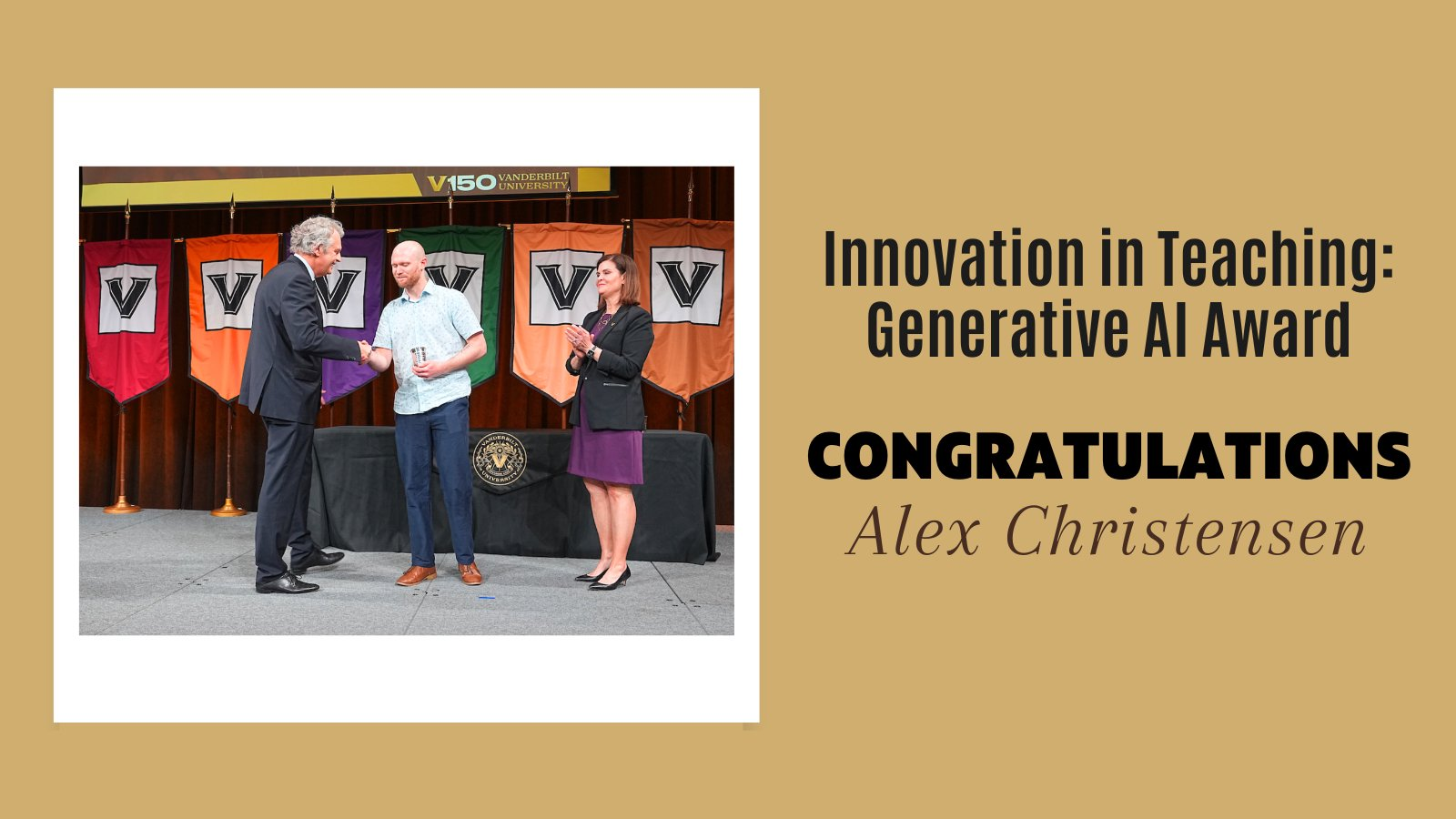Recognizing Innovation in Education
On April 11, at the Spring Faculty Assembly, Chancellor Daniel Diermeier and Faculty Senate Chair Andrea Capizzi of Vanderbilt University took a moment to acknowledge and celebrate the remarkable contributions of its faculty. Among the honorees, Professor Alex Christensen stood out for his exceptional use of generative AI in education, earning him the inaugural Innovation in Teaching: Generative AI Award. As an Assistant Professor of Psychology and Human Development and an affiliate faculty member of the Data Science Institute (DSI), Professor Christensen integrates his expertise in data science to enhance interdisciplinary learning environments. His affiliation with the DSI underscores his commitment to leveraging cutting-edge AI technologies to not only enrich his curriculum but also to foster an academic culture that embraces technological advancements. This award highlights his innovative approaches that significantly improve student engagement and understanding through the application of generative AI tools in the classroom.
Deepening Ties with the Data Science Institute
Professor Alex Christensen’s affiliation with the Data Science Institute (DSI) at Vanderbilt has contributed to his innovative teaching methods. His journey at Vanderbilt began with a memorable interview process, during which he met Chief Data Scientist, Dr. Jesse Spencer-Smith and Senior Data Scientist Dr. Charreau Bell. “I credit my dive into generative AI to Charreau Bell and Jesse Spencer-Smith, who during my interview with Vanderbilt for my current position, talked to me about LLMs. They were further gracious enough to allow me to join their AI workshops (AI Summer) that ignited my imagination with possibilities of what these models could do,” Alex recalls. This early exposure played a role in his decision to join Vanderbilt and has helped shape his teaching and research.
Integrating AI into Learning
Professor Alex Christensen has been a pioneer in integrating generative AI into educational settings at Vanderbilt. His innovative approach involves developing tools that enable students to generate their own practice quizzes, enhancing their engagement and deepening their understanding of complex concepts. Reflecting on the integration of AI into his teaching, Christensen suggests the tool is designed to foster a deeper understanding of a given subject matter, enabling students to identify gaps in their knowledge autonomously. By interacting with AI, they tackle the areas they find most challenging in a more targeted and efficient manner.
Over the winter break of 2022, OpenAI released ChatGPT and flipped Alex’s world upside-down. After exploring what was now possible, he knew he had to write something into the syllabus as a policy for ChatGPT: “Data science is at the forefront of the AI revolution. As teachers, especially of data science, we cannot ignore the impact of the latest models called transformers. These models are capable of writing code, poems, and papers as well as creating visual art.” Alex encourages the use of such technologies in the classroom while emphasizing academic integrity. “You can use ChatGPT or other models to write code for you; however, I ask that you write down that you’ve used ChatGPT to aid the production of the code used in this problem. Failure to provide this statement will be considered cheating per Vanderbilt’s academic honor code,” he asserts.
To this day, the policy has held up and hasn’t changed much.
The Future of Teaching and Generative AI
“The future of teaching and generative AI is challenging,” begins Professor Alex Christensen. “The rate of change in the progress of generative AI is really challenging to keep up with when prepping a course that is usually months before the course happens or if you’re further along in your career when you already have materials prepped.” He explains the rapid advancements in AI technology and their implications for educational preparation, citing his own experience with the release of GPT-4 during the Spring 2023 semester.
Alex also discusses the diverse applications of generative AI across different courses: “I was fortunate to be teaching many courses that include coding, which can immediately benefit from generative AI in positive and productive ways.” He expresses hope that future courses might reduce the emphasis on coding itself, envisioning a shift towards “Natural Language Programming,” which focuses on applying conceptual knowledge directly through AI, minimizing the coding requirement.
Reflecting on the broader educational landscape, Alex notes, “As we move forward, generative AI will continue to be integrated into the classroom, and students will be able to do more faster.” He emphasizes the value of deep knowledge, suggesting that understanding the material allows students to use AI more effectively and creatively. “The more you know, the deeper you can go into the model’s knowledge,” he adds, highlighting the creative benefits of extensive knowledge and the importance of distinguishing fact from fiction in AI-generated content.
Concluding his thoughts, Alex underscores the importance of transparency and integrity in the use of AI. “It’s not to say that we shouldn’t use generative AI but instead that we need to be transparent about the work that was created solely by generative AI, solely by the person, and in tandem,” he advises. He anticipates that human-to-human interactions will remain central in education due to the intrinsic rewards of engaging with others and learning directly from them.
Explore AI This Summer
Inspired by the transformative potential of AI in education? Join the AI Summer program at the Data Science Institute. It’s an excellent opportunity for individuals at all levels of expertise to explore the current state of AI, guided by leading educators like Jesse Spencer-Smith and Charreau Bell.
Contact
For any inquiries, reach out to datascience@vanderbilt.edu.
